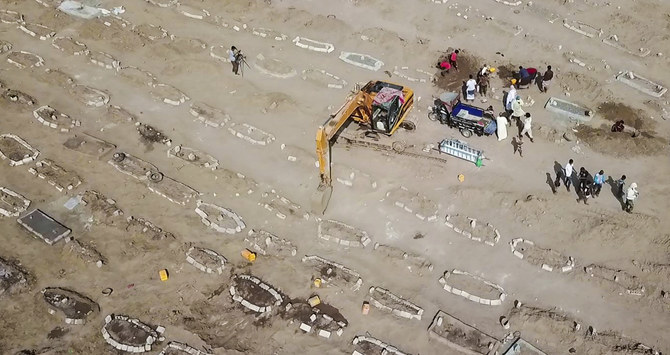AL-MUKALLA: Yemen began repatriation flights on Thursday for thousands of Yemenis stranded abroad due to coronavirus lockdown. However, there were fears that those repatriated might push up coronavirus cases in the war-ravaged Yemen.
In March, Yemen’s internationally recognized government canceled flights to and from the country’s airports to prevent the spread of coronavirus. Thousands of Yemenis stranded abroad sent appealed to the government to arrange rescue flights as they had run out of money.
A plane operated by Yemenia, the national airline, touched down on Thursday at Seiyun Airport in the southeastern province of Hadramout carrying 152 Yemenis from Amman amid heavy safety procedures. These included preventing the passengers from having contact with the airport staff and disinfecting their luggage and the plane. A health worker wearing personal protective wear collected passports as other workers disinfected the luggage.
“The travelers were not allowed to enter the terminal building. Buses carried them from the airport tarmac to their homes,” a worker at the airport told Arab News, speaking on the condition of anonymity because he was not authorized to speaker to reporters.
A Yemenia plane might be carrying the same number of stranded people from Cairo airport to Seiyun airport next week, the airport worker said.
Yemeni government officials said that Thursday’s flight from Amman is part of a larger plan to evacuate more than 10,000 Yemenis by air, land and sea in June.
A local government official in Aden told Arab News that the Yemeni government would pay for plane fuel, empty seats and Polymerase chain reaction (PCR) tests for COVID-19 in some countries. “We have paid a big bill to bring them back home,” he said. All stranded people would have to do PCR tests to make sure that they are free of the virus 48 hours before leaving their host countries.
“The biggest concentration of stranded Yemenis is in Egypt, where we signed contracts with local labs for coronavirus tests,” the government official said. More than 1200 stranded Yemenis in the UAE will be carried on UAE commercial flights to Riyan airport in the city of Al-Mukalla. The UAE will provide them with free of charge coronavirus tests. Stranded Yemenis in Oman and Saudi Arabia can go by land to Yemen provided they are carrying coronavirus test reports. Yemenis in Djibouti would have to sail to Yemeni seaports on the Red Sea, the government official said.
Regarding stranded Yemenis who live inside Houthi-controlled areas, the Yemeni government official said a Yemenia plane would touch down in Sana’a but not before receiving a formal assurance from the UN that the Houthis would allow planes to depart Sana’a airport. “We are worried that the Houthis might seize the planes,” the government official said.
Despite the announcement of the government repatriation process, stranded Yemeni arranged sit-ins in many countries, demanding immediate evacuation. On Thursday, dozens of Yemenis arranged a small sit-in in the Indian capital to demand their government to accelerate the repatriation process. “We heard about rescue flights from Amman. Our situation here in India is different. Those who are sick cannot not find money to buy food, let alone medicine. We want the government to arrange at least one flight a day to bring us back home,” a protester said in a video seen by Arab News.
The Aden-based national coronavirus committee said on Wednesday that seven new cases in Taiz, Shabwa and Dhale brought the total number in Yemen to 256, including 10 recoveries. It said there have been one new death, bringing the total number to 53 fatalities.














